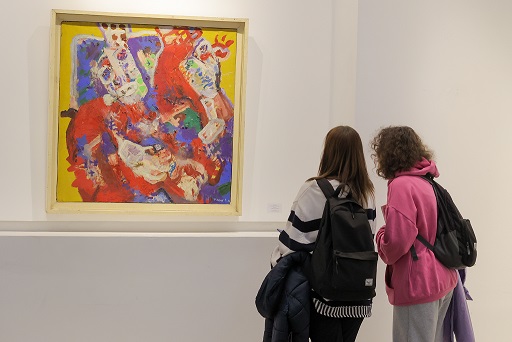As part of events marking Francophonie Month, an exhibit aiming to explore the Parisian influences on the great Macedonian painters opened at the National Gallery’s Chifte Amam on Thursday. The paintings will be on display through March 25.
Organized together with Skopje’s French Institute, “Paris Reflections 2” contains 39 artworks curated from the National Gallery collection.
It comes a year later after the first “Paris Reflections” exhibition of paintings by artists who influenced the development of Macedonian art through engaging with surrealism, art informel, and other art movements.
At the opening, National Gallery head Dita Starova Qerimi said the second exhibit presented the works of influential Macedonian artists born before 1930 who developed the post-WWI art scene.
She said the artists included Vangel Kodzhoman, Vasilie Popovikj Cico, Borislav Trajkovski, Dimitar Kondovski, Tomo Shijak, Petar Mazev, Spase Kunovski, Ordan Petlevski, Ivan Velkov, Bogoljub Ivkovikj, Risto Lozanoski, Vancho Gjorgjievski, Trajce Janchevski, and Vangel Naumovski.
In his address, President Stevo Pendarovski said art, in addition to its aesthetic value, connected people.
“In our case, these are the cultural specifics of Macedonia and the French Republic,” President Pendarovski said, adding that “the history of Macedonian fine art, as well as the history of fine art in general, cannot even be imagined, let alone displayed, without the School of Paris.”
“The School of Paris,” the President continued, “is synonymous with progressiveness, the avant-garde, freedom of expression. Values that Macedonian artists, ready to discover new horizons and connect them through art to their native environment, have accepted with an open mind and the intention to be part of European and international modern art.”
French Ambassador Cyrille Baumgartner said it was evident the Paris School had greatly influenced 20th-century Macedonian painters.
“Paris was present in their colors, in their brushstrokes, in their subjects,” Ambassador Baumgartner said.
Recalling that the first exhibition focused on Macedonian artists from the first half of the 20th century — Nikola Martinoski, Lazar Lichenoski, Borko Lazeski — he highlighted that “the story of cultural affinity between in our two countries it is not one-sided.”
“French artists have stayed here and drew inspiration,” he noted, pointing to a section of the exhibition devoted to French artists who have completed art residencies in Macedonia.
The French ambassador added that the Francophonie Month was not only celebrating the French language “but also the values it brings: linguistic diversity and, even more so, cultural diversity.
Source: MIA





Comments are closed for this post.